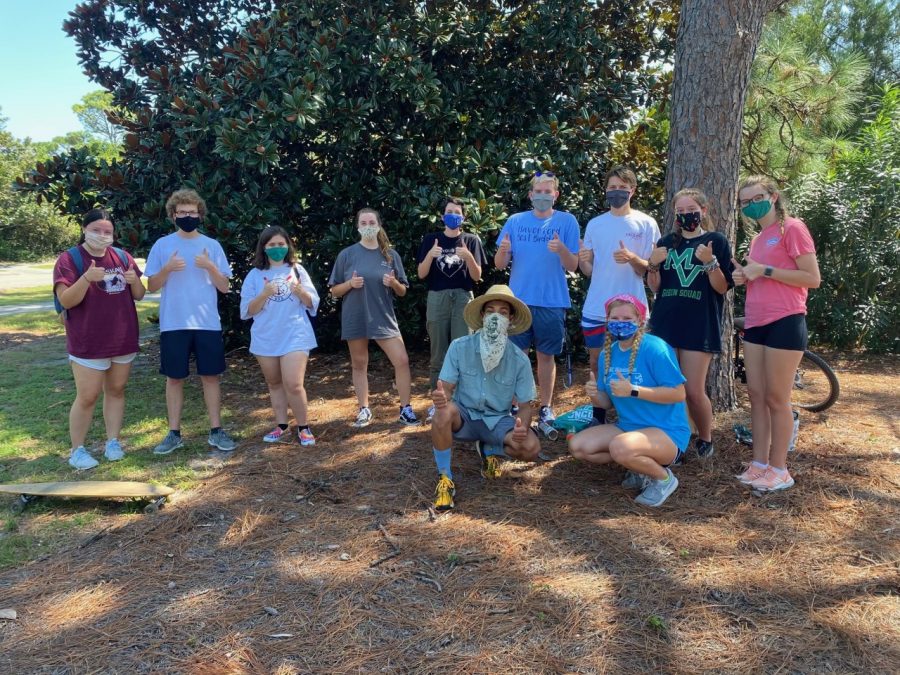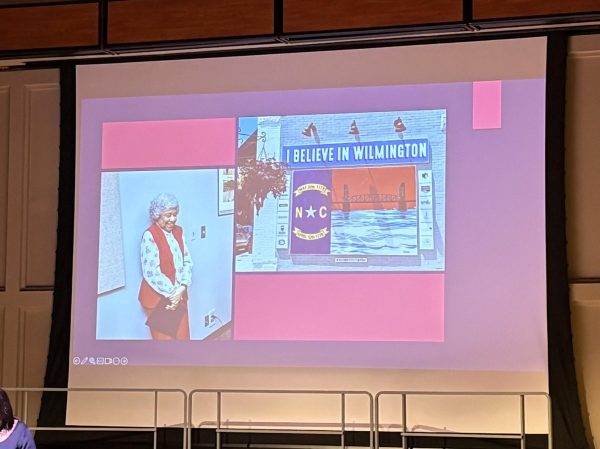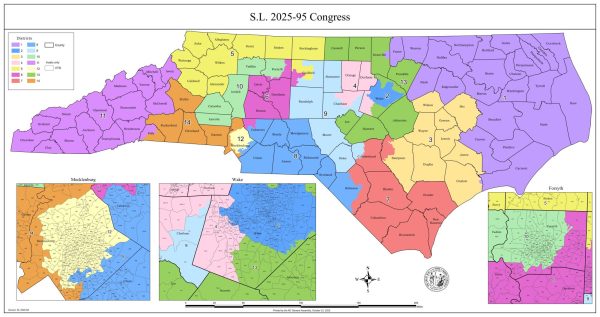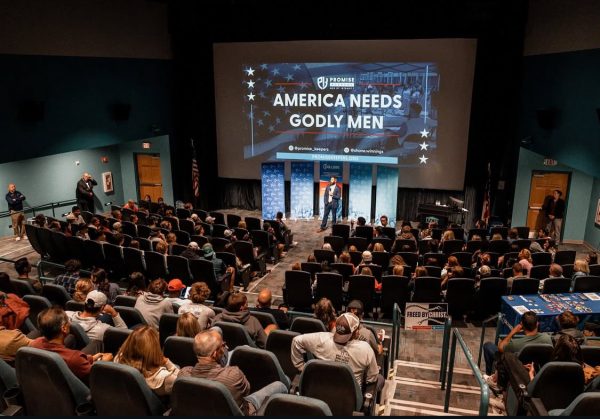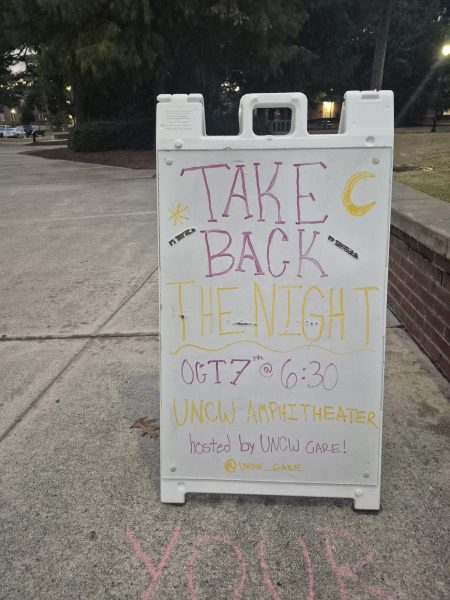Sustainable seahawks exemplifies the power behind student-faculty partnerships
Freshmen students in the Sustainable Seahawks living learning community
In early 2018, UNC Wilmington (UNCW) undergraduate Ian Shields started working on Sustainable Seahawks, a project that would take three years to come to full fruition.
While Shields was in the process of applying to universities, he saw that some institutions had sustainability learning communities. After deciding on UNCW, Shields saw the need for a similar program here on campus that provided students with a thematic entrance into college. His vision was to create a learning community that would teach students how to live their personal lives sustainably, to contribute to campus projects and to engage the larger community sustainably.
Shields began by presenting his project idea to UNCW’s Chief Sustainability Officer, Kat Pohlman. As Chief Sustainability Officer, Pohlman ensures the university finds a compromise between people, planet and profit.
“Sustainability is about finding win-win solutions,” Pohlman said.
Pohlman introduced Shields to Dr. Ann Rotchford, a senior lecturer in the Department of Sociology and Criminology, who was interested in developing an environmental sociology course. The three of them began meeting and working together regularly.
“From there, we further developed some of the ideas for the learning community,” said Shields.
The team then met with the chair of the Environmental Sciences Department, Dr. Jeffery Hill, and the chair of the Sociology and Criminology Department, Dr. Mike Long.
“Without the support from the department chairs, nothing can happen. We had all the support we could ask for,” said Rotchford.
Hill explained that the department had been looking to build a similar project when they were presented with Sustainable Seahawks.
“We had been exploring options to engage in a learning community that really captured the incredible interest in sustainability and engaged students early in their academic career,” Hill said.
Shields put together all the parts.
“Apart from being highly motivated and creative, Ian is also involved in the RA program in the residence halls so (he) could sense that there was a demand for a sustainability-themed learning community,” said Long. “it was Ian’s drive, perseverance, and motivation that made the learning community possible.”
Even with the support of various faculty members and departments, Shields encountered some challenges in the creation of Sustainable Seahawks.
“Bringing together various offices, like having University College and Housing (and Residence Life) communicate, was difficult,” said Shields.
He described the difficulty in finding a time in which all parties involved could meet. Another challenge was funding for the program. Rotchford explained that this project could not have gone forward without the Community Engagement Grant from the Office of Applied Learning.
After these meetings, the team began thinking of instructors that would work well with the goals of the community.
“Ian had a list of instructors he had already thought of,” said Rotchford.
Pohlman now teaches UNI 101 to the students of Sustainable Seahawks, with a focus on sustainability as it relates to UNCW, Rotchford teaches SOC 215, Modern Social Problems and Long now teaches EVS 205, Global Environmental Issues.
“With one of Environmental Sciences’ most engaging faculty, Amy Long, joining the team, it all came together,” said Hill.
In EVS 205, Long teaches about the impacts people can have on the Earth and the environment.
“We have laid the foundation for discussing global environmental issues by examining human population trends and the Anthropocene; to understand how human actions are impacting the environment negatively and positively,” said Long. “We have covered biodiversity loss, water quality and access issues, and are wrapping up discussions on soil degradation and food system impacts.”
Students are also challenging themselves to track behavior change in their own lives in hopes of reducing their ecological footprints, and will later extrapolate the effect that this behavior change would have if all of UNCW took the same steps. Those results will be shared on the UNCW Sustainability website at the end of the semester.
Over the summer, Pohlman created a project for Sustainable Seahawks students to partake in a service-learning experience. The students are currently working with the Good Shepherd Center and the Wilmington Compost Company and learning to create a compost bay. They are not only learning how to compost but are actively involved in the process with both community partners.
“They are creating the marketing and training, and learning how to use compost in the backyard for the center,” said Pohlman. “The Good Shepherd Center helps those who are experiencing homelessness and food insecurity. I think people, planet and profit are covered well in this project.”
The three professors now work together to align the material being covered in each course so that the students receive an interdisciplinary learning experience.
“We built our schedules so that we are all in sync so that we are all talking about related topics at the same time,” said Rotchford. “A long term goal for this community is for the students to understand the link between social justice and environmental issues. There is an inevitable link therebetween things like gender equality, environmental racism and social equity.”
Looking into the future, Shields hopes that Sustainable Seahawk students find ways to give back to UNCW and the greater community.
“Every round of students has new ideas, and we hope to help them implement these ideas,” Shields said. “Look at this project as an academic workshop. Through this program, the students learn the skills to help them build bigger and better projects in their future careers.”
In addition to learning project skills, students also get the opportunity to understand the impact their choices have.
“The Sustainable Seahawks LLC is an opportunity to show young people that despite the negative press and media attention, there is hope for our planet and they have power in their choices, as consumers and voters,” said Long.
Although Sustainable Seahawks is a freshman year learning community, sustainability efforts at UNCW go beyond just the freshman year experience.
“Sustainability is not an office, it’s a culture,” said Pohlman “It’s everyone doing their part. Everything you do matters.”
Pohlman and Rotchford both encourage all students to sign the sustainability pledge, check out the website and join the sustainability committee.


